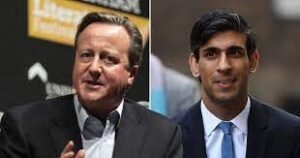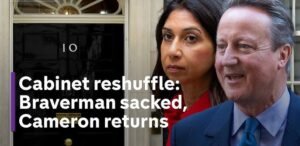
In an unforeseen twist of political fortunes, the erstwhile UK Premier, David Cameron, has orchestrated a noteworthy resurgence on the political stage. This unexpected maneuver transpired within the context of a substantial cabinet overhaul masterminded by the current Premier, Rishi Sunak. Cameron, once the steward of the nation, is now poised to navigate the intricate terrain of foreign affairs, commonwealth relations, and developmental matters in his newly assumed role as Secretary of State. This unparalleled return has reverberated through the political sphere, prompting a meticulous examination of the intricacies underlying the reshuffle, the motivations steering such a decision, and the potential ramifications for the British government.
Details of David Cameron’s Appointment
In his freshly anointed capacity as the Foreign Secretary, David Cameron steps into a role that necessitates keen diplomatic acumen, particularly in the aftermath of the seismic Brexit event. His reinstatement to a position of considerable influence sparks contemplation on the repercussions for foreign policy determinations, the convergence of strategic interests, and the conceivable impact on the United Kingdom’s global stature. The synchronization between Cameron and Sunak in navigating these convolutions will undoubtedly mold the trajectory of British foreign relations.
Brief on Cameron’s Premiership and Resignation
David Cameron presided over the UK as Prime Minister from 2010 to 2016, helming the Conservative Party. His tenure was punctuated by pivotal decisions, including the 2016 Brexit plebiscite. However, following the unforeseen outcome of the referendum, where a majority opted for departure from the European Union, Cameron relinquished his premiership, acknowledging the imperative for fresh leadership to navigate the intricate challenges posed by Brexit.
The Permissibility of Cameron’s Appointment
The query arises as to how Cameron, not a sitting Member of Parliament, can assume a cabinet role. The answer lies in his standing as a member of the House of Lords, the upper echelon of the UK Parliament. Cameron’s peerage provides a legitimate avenue for active involvement in governmental affairs despite his absence from the House of Commons. This distinctive facet of the British political system facilitates individuals with substantial political experience, such as Cameron, to contribute to governance even after their electoral departure.
The Rationale Behind the Reshuffle
The reshuffle, orchestrated by Prime Minister Rishi Sunak, aspires to infuse a novel perspective and expertise into pivotal governmental positions. This strategic maneuver is part of Sunak’s overarching strategy to fortify the government’s approach to foreign affairs and development, especially in the face of evolving global challenges.
Cameron’s Precedence Over Suella Braverman: The high-profile appointment of David Cameron comes at the expense of Suella Braverman, the former home secretary, who was relieved of her duties in the reshuffle. The decision to supplant Braverman, renowned for her polarizing policies, intimates a shift in the government’s approach to domestic affairs.
Public Response to Cameron’s Reinstatement
The public reaction to Cameron’s return manifests as a confluence of astonishment, skepticism, and inquisitiveness. While some extol the resurgence of an adept statesman, others voice apprehensions about potential controversies stemming from David Cameron’s prior tenure. Social media platforms hum with deliberations on whether this move will positively contribute to the government’s efficacy or reignite debates surrounding Cameron’s legacy.
Analysis and Speculation on Cameron’s Resurgence

Cameron’s unforeseen return to a salient political post raises inquiries about the motivations steering Sunak’s decision. Analysts speculate that Sunak may be endeavoring to leverage Cameron’s diplomatic sagacity to navigate intricate international relations, especially in the aftermath of geopolitical shifts. Furthermore, Cameron’s familiarity with global leaders could potentially fortify the UK’s position on the world stage. However, detractors posit that David Cameron’s return may eclipse the government’s efforts to present a new image, given the controversies surrounding his resignation in the context of the Brexit plebiscite. The analysis is divided on whether this move is a strategic masterstroke or a precarious gamble for Sunak and his administration.
Future Implications
The enduring implications of David Cameron’s return to the Cabinet remain uncertain. The success of this strategic gambit hinges largely on Cameron’s adept navigation of the evolving political landscape and his ability to bring a novel perspective to the challenges confronting the UK in foreign affairs and development. Should Cameron adeptly navigate the intricacies of international relations and contribute positively to the government’s objectives, it may bolster Sunak’s leadership and enhance the UK’s global standing. Conversely, any missteps or controversies associated with Cameron’s past could potentially undermine the government’s credibility.
Conclusion

In conclusion, the appointment of David Cameron as the Secretary of State for Foreign, Commonwealth, and Development Affairs in a substantial cabinet reshuffle has introduced an unforeseen chapter to UK politics. The public’s response, the scrutiny of this resurgence, and the future implications allude to a dynamic period ahead for the government and its foreign policy strategies. As Cameron reenters the political arena, the efficacy of this maneuver will be closely monitored by both proponents and detractors. Only time will reveal whether this reshuffle proves to be a strategic masterstroke or a calculated risk for Prime Minister Rishi Sunak.










